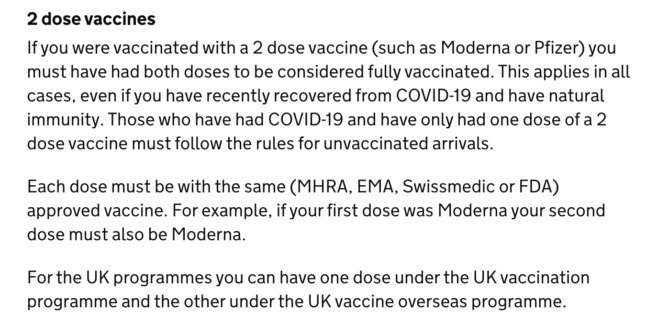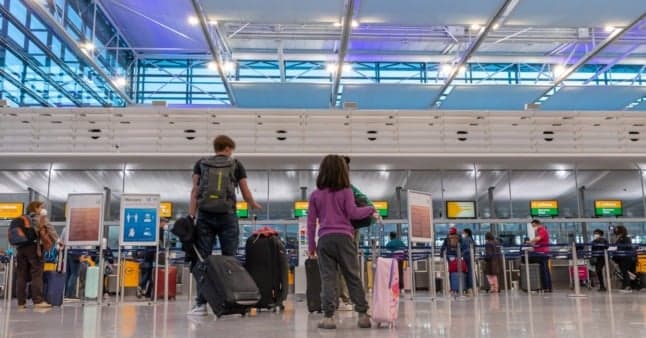What's this about?
The British government eased rules for many fully vaccinated travellers coming from the EU at the start of August.
But UK travel rules during recent months have been tricky to understand, not least because there are different definitions of "fully vaccinated" compared to the EU.
The British government’s strict definition of “fully vaccinated” is that it means having two injections of a double-dose vaccine, such as Pfizer-BioNTech, Moderna, or AstraZeneca, or one injection of the single-dose Johnson&Johnson – while Germany and the EU also consider those who have recovered from the virus and who have had a single dose of any vaccine to be fully protected.
The same applies to people who had different vaccines for the two doses - known as Kreuzimpfung in Germany. This is considered normal, but the UK government insists that you are not ‘fully vaccinated’ unless both your doses were of the same brand.
READ ALSO:
- UK changes travel rules again to impose quarantine on European arrivals with mixed doses
- German words you need to know - kreuzgeimpft
People who fall into these categories are able to get the EU Covid pass in Germany.
In Germany, people who have one jab after a recent Covid infection are viewed as having the same level of immunity as someone who's had two doses.
The pass will say “vaccination 1 of 1” to show that it’s a considered a full course. The certificate also shows the date of vaccination, your name and date of birth.
Germany is not the only country with this policy. France and other countries in Europe also consider someone to be fully vaccinated if they have had one jab after recovering from Covid.
Okay so do I have to quarantine?
These rules have led to some confusion over whether those in Germany who have been ill with coronavirus, recovered and had a booster injection can travel to the UK without having to quarantine for 10 days - and pay for two tests on day two and day eight.
READ ALSO How to book that ‘Day Two’ Covid-19 test if you’re travelling from Germany to the UK
But there's good news - if you fall into this category you currently do not have to quarantine because Germany is on the UK's green list.
That means that unvaccinated people can also avoid quarantine. While Germany is a green country, anyone travelling to the UK - regardless of vaccination status - only has to pay for the day two test.
You should keep in mind that the UK will classify you as unvaccinated if you've had one shot after Covid, but it won't be a huge problem. Likewise, you'll also be classed as unvaccinated if you've had two shots from two different vaccines (so you're kreuzgeimpft).
READ ALSO: Germany added to the UK's green list - what does it mean?
What if it changes?
It will be a major concern to many people if Germany is bumped up to the UK's amber list again. As infections are rising in Germany, it's not unlikely that this will happen in future.
If Germany's status changes to amber, vaccinated people will be able to skip the 10 day quarantine and two tests when arriving in the UK (but they will still need a day two test). Unvaccinated people (including the two categories we mention above) will not.
What happens if I transit through an amber list country from Germany?
It's important to note that if you travel through an amber list country - like France - to get to the UK, the amber list country rules will apply.
The Local Germany reader Petrina got in touch with us to say she was worried about her travel plans because her husband had Covid last year and received a booster jab - and they were planning to travel from Germany through France.
The UK government says people “need to show an EU Digital COVID Certificate (EU DCC), showing you’ve had a full course of an EMA or Swissmedic-approved vaccine”.
The below extract is also from the UK Government:

What have amber-list country embassies said?
Foreign embassies from current amber list countries have been flagging up this issue.
The British Embassy in Paris said in a recent post: "Natural immunity (i.e. having had Covid) plus one dose of vaccine under an approved European vaccination programme is not considered a full course, even if you are listed as fully vaccinated on your EU Digital COVID Certificate.
"You must have had both doses of an approved two-dose European vaccination programme (eg Vaxzevria/AstraZeneca, Pfizer, Moderna) or the single dose of an approved single-dose European vaccination programme (eg Janssen).
A message on the Facebook page of the British embassy in Spain says: “Please be aware that the UK does not recognise natural immunity for international travel at this time, but this will be kept under review. We know that the EU DCC does enable people to prove natural immunity.
"This is not currently accepted in the UK and quarantine and day 8 testing requirements will only be eased, for those who have been fully vaccinated in a relevant European country, with an EMA-approved vaccine,” it says.
The Local asked the UK government whether there is a chance this position will change. A spokeswoman confirmed the current rules but did not comment on whether they will change in future.

Join the conversation in our comments section below. Share your own views and experience and if you have a question or suggestion for our journalists then email us at [email protected].
Please keep comments civil, constructive and on topic – and make sure to read our terms of use before getting involved.
Please log in here to leave a comment.